
Jason Bedrick and I co-authored a new study for the Heritage Foundation last week in which we test an assertion made by Texas choice opponents: choice will destroy rural education. Opponents bandy this assertion as if it were a self-evident fact, but can the assertion withstand scrutiny?
Sadly, we noted that Texas public schools seemed to be doing a rather remarkable job of damaging student learning in the absence of choice. The National Assessment of Educational Progress contains data on rural achievement starting in 2007. It’s not pretty in rural Texas:
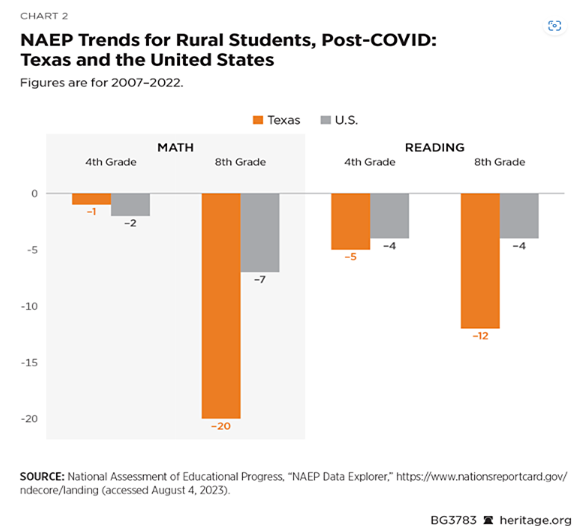
On these exams 10 points roughly equals a grade level worth of progress. Unfortunately, this means that Texas eighth graders demonstrated a command of mathematics in 2022 roughly equivalent to what we would have expected out of a group of Texas sixth graders in 2005. COVID-19 does not account for all of this decline. Between 2007 and 2019, eighth grade students saw approximately a grade level decline in math achievement, and the state suffered another grade level drop between 2019 and 2022.
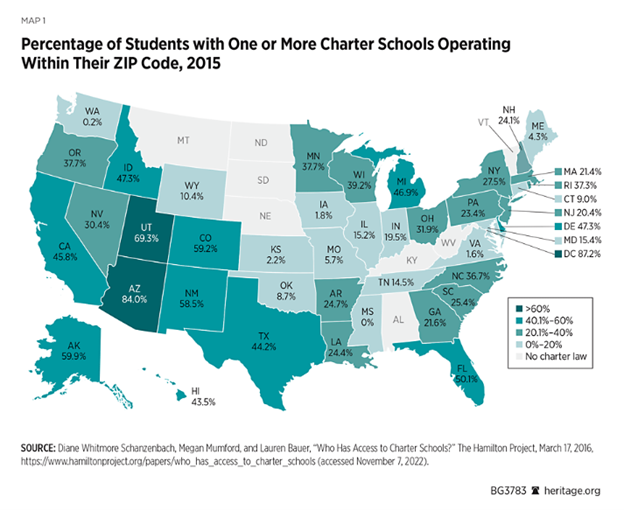
To make the case for choice in rural communities more concrete and less theoretical, we compared academic trends in rural Texas with academic trends in rural Arizona. Arizona has the nation’s largest and most geographically inclusive charter sector (see map above), a very active system of district open enrollment in which nearly all districts participate, tax credit scholarships, ESAs, state funded microschools, homeschooling, and digital learning options.
All of these options reach into rural Arizona communities. Has Arizona rural education suffered “destruction?” No. All Arizona school districts that were educating students in 1993 (the year before the advent of choice) are still educating students in 2023. Moreover, unlike Texas, the academic trends for rural Arizona students have been positive:
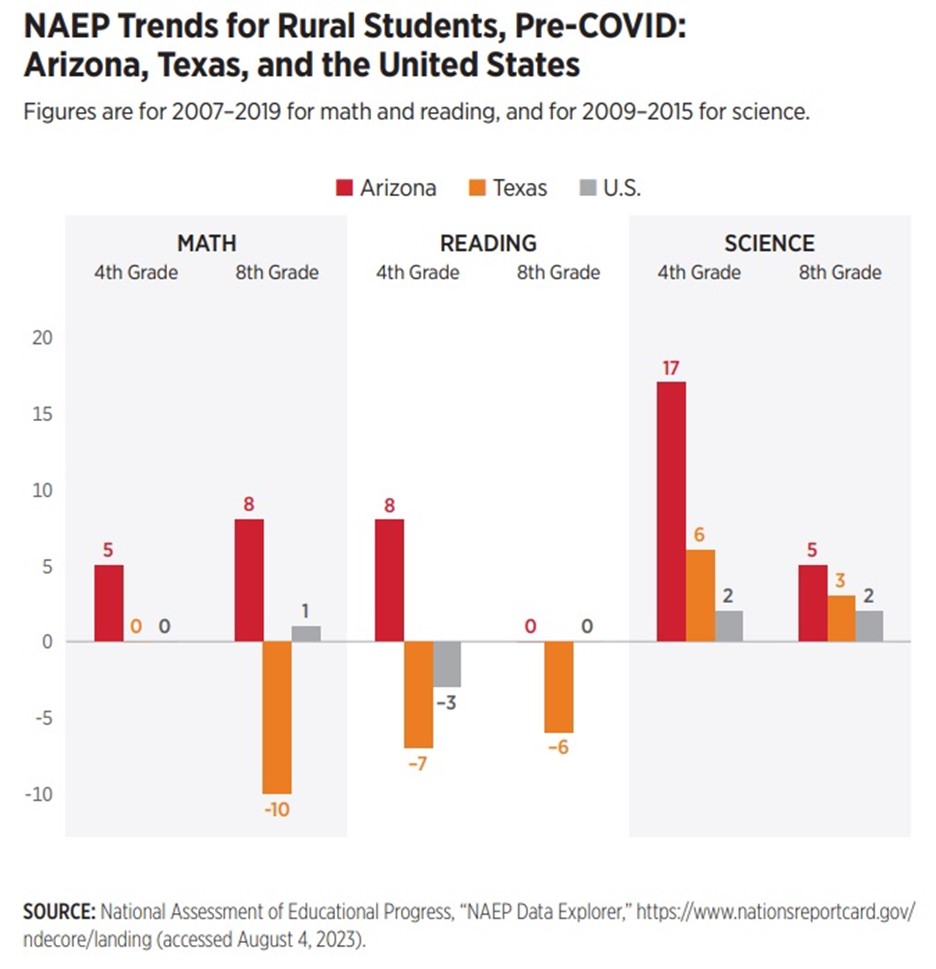
Arizona rural school districts didn’t get the apocalyptic destruction memo. They not only still exist, but their outcomes also improved over time. The Stanford Educational Opportunity project provides a separate source of data showing a similar trend. Stanford scholars linked state testing data in grades 3-8 to enable comparisons across jurisdictions for the 2008-2018 period. Academic growth represents the best measure of school quality, and the project provides growth data for rural school districts (while averaging in charter scores with those of the district in which they reside).
This is my “friendly neighborhood school choice mad scientist makes an excel chart” presentation of that data for rural districts in Arizona and Texas:
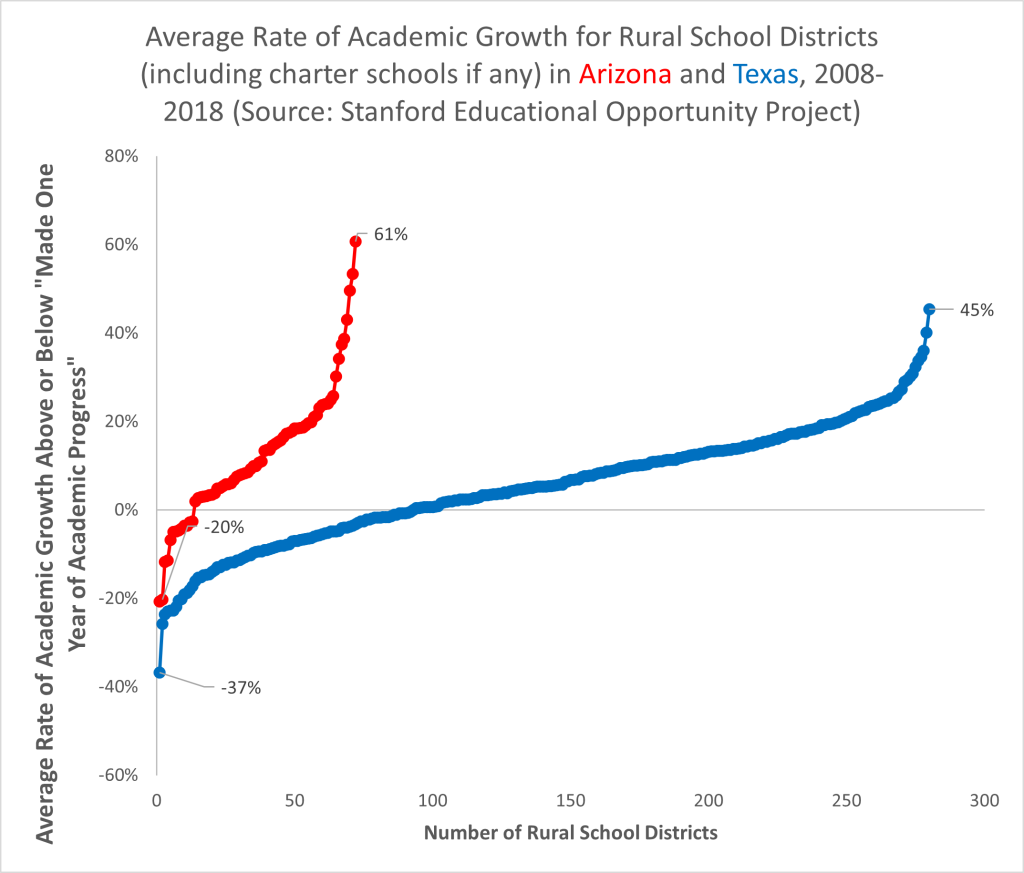
And this is the much-improved version of the same data from the data-wizards at Heritage:
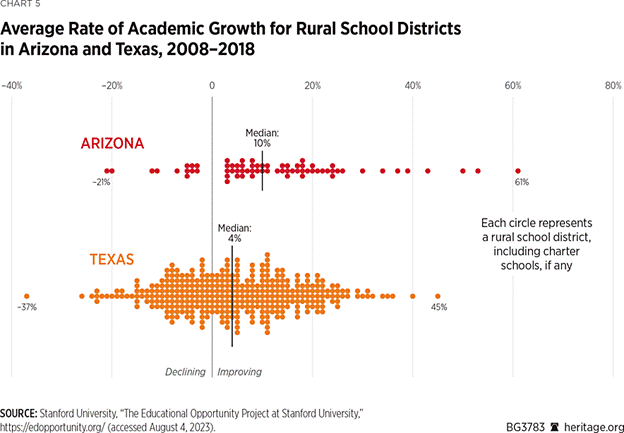
The choice-induced death of rural education appears to have been greatly exaggerated. Choice will be rapidly growing in rural areas of many states in the aftermath of the 2023 legislative sessions. Texas families and teachers deserve these freedoms as well. Arizona lawmakers have empowered teachers to create their own schools and families to sort between schools to find the best fits. Rural teachers and students benefit from variety just like everyone else. Rural Texans have nothing to lose and much to gain from choice.
Florida's charter schools might not raise students' reading and math scores a whole lot, on average, but attending one may increase a student's chances of reaching college, or earning more money later in life, newly published research suggests.
We first highlighted the working paper more than two years ago. An updated version appeared Monday in the Journal of Policy Analysis and Management.
The researchers (Tim Sass of Georgia State University, Kevin Booker and Brian Gill of Mathematica Policy Research, and Ron Zimmer of Vanderbilt University) looked at students who attended Florida charter schools in eighth grade between the 1998-99 and 2001-02 school years. They compared those who went on to attend charter high schools with those who enrolled in traditional high schools.
They found the charter high school students were about 9 percent more likely to enroll in college, and had an earnings advantage of nearly $2,300 by their mid-20s.
"The positive relationships between charter high school attendance and long-term outcomes are striking, given that charter school students in the same jurisdiction have not been shown to have large positive impacts on students' test scores," they write.
The authors caution "unobservable" differences between charter and non-charter students could affect the results, and that Florida's charter school landscape has changed a lot in the 14 years since the students in the study finished middle school. But they probed their results using a variety of statistical techniques, and concluded they appear "robust." (more…)
Students who attend Florida charter high schools are more likely to persist in college and earn more money than their counterparts in district schools, an “especially striking” finding given little differences in test scores, according to a new working paper. (Hat tip: Colin Hitt at Jay P. Greene’s Blog).
The paper is co-authored by four researchers, including Tim Sass, formerly an economics professor at Florida State University and now at Georgia State University. It builds on earlier research that found students in charter high schools in Florida and Chicago were more likely to graduate from high school and enroll in college than like students in traditional public schools. (Both groups examined attended charter schools in eighth grade.) The more recent data continues to show the same thing. But the researchers also found:
In both cases, the researchers found the differences to be statistically significant. They write in their conclusion:
“Exactly what charter schools are doing to produce substantial positive effects on educational attainment and earnings is an open question. Charter high schools might be able to produce positive effects on initial college entry merely by providing better counseling and encouragement to apply and enroll. But that could not explain higher rates of persistence in college or higher earnings, suggesting that charter high schools are endowing their students with skills that are useful for success in college and career but that test scores do not capture. The fact that charter high school students have higher earnings even if they do not attend college further supports this interpretation …
“Positive impacts on long-term attainment outcomes and earnings are, of course, more consequential than outcomes on test scores in school. It is possible that charter schools’ full long-term impacts on their students have been underestimated by studies that examine only test scores.”
In Florida, those studies include this, this, this and this.